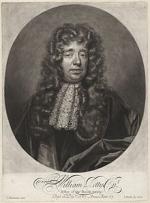Disable ads!
William Petty
This article is about the English scientist. For the British Prime Minister, see William Petty, 2nd Earl of Shelburne. For other people named William Petty, see William Petty (disambiguation). William Petty William Petty Born 26 May 1623 Romsey Died 16 December 1687 London Era 17th-century philosophy (Modern philosophy) Region Western philosophy School Classical economics Main interests Political philosophy, ethics, economics Notable ideas Division of labour, the growth of London, fiscal theory, monetary theory, national income accounting, economic statistics Influences Aristotle, Hobbes, Francis Bacon Influenced Mandeville, Adam Smith, Keynes, Karl Marx Sir William Petty FRS (26 May 1623 – 16 December 1687) was an English economist, scientist and philosopher. He first became prominent serving Oliver Cromwell and Commonwealth in Ireland. He developed efficient methods to survey the land that was to be confiscated and given to Cromwell's soldiers. He also managed to remain prominent under King Charles II and King James II, as did many others who had served Cromwell. He was Member of the Parliament of England briefly and was also a scientist, inventor, and entrepreneur, and was a charter member of the Royal Society. It is for his theories on economics and his methods of political arithmetic that he is best remembered, however, and to him is attributed the philosophy of 'laissez-faire' in relation to government activity. He was knighted in 1661. He was the great-grandfather of Prime Minister William Petty Fitzmaurice, 2nd Earl of Shelburne and 1st Marquess of Lansdowne.
 Read more on wikipedia.org Read more on wikipedia.org
 All quotes by William Petty All quotes by William Petty
 Edit Edit
|

|
|
|
|
|
Background photo by Giuliana
|